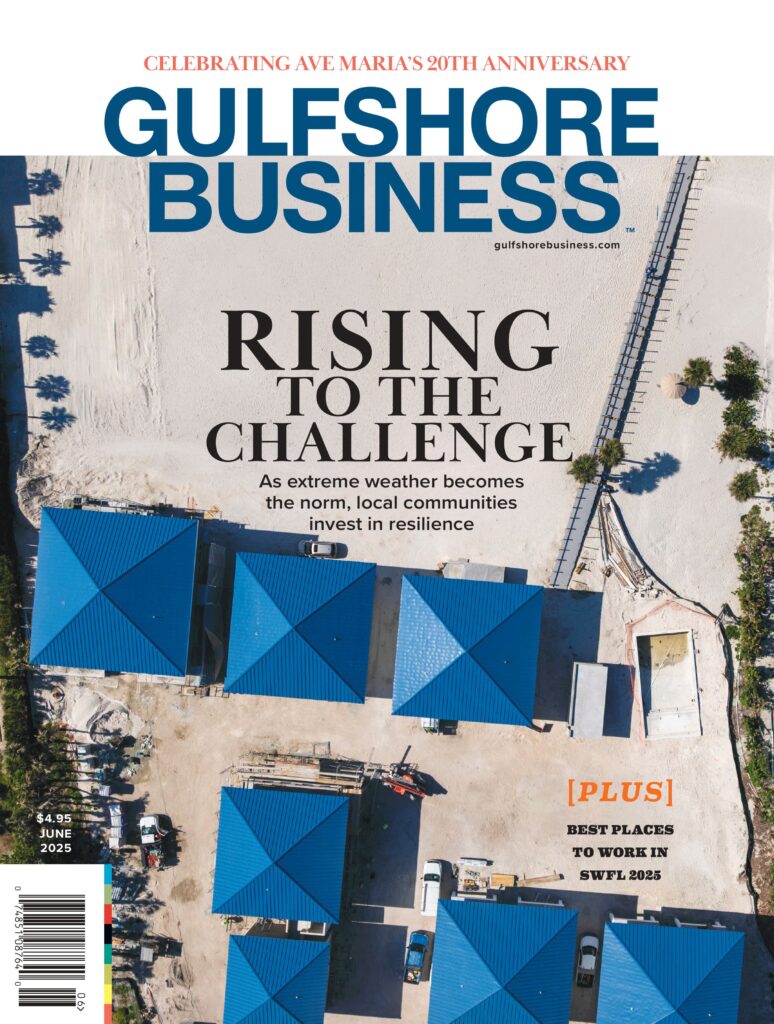
FINE DINING: While many businesses are struggling with the minimum wage increase, Sails Restaurant in downtown Naples is not affected by it because the restaurant already pays “super premium” wages, says Veljko Pavicevic, co-founder and manager of Sails.
The past year has been challenging, to put it mildly, at places such as Bubba’s Roadhouse in Cape Coral. Owner Jay Johnson navigated a pandemic while juggling a staffing shortage and rising costs of food. Then, as things were getting back to normal—whatever that means— he had to recalibrate his payroll.
Thanks to the passage of Amendment 2 last October, the first of five increases in the state’s minimum wage goes into effect Sept. 30. After a slight increase to $8.56 back in January, the new wage will be $10 this year, then increase $1 annually until 2026. The looming costs have served as a source of anxiety for business owners like Johnson. In his case, he’s estimating an $85,000 hike in his payroll due to the new law.
His cooks and dishwashers already make $13-$15. But the tipped wage is also increased—this year to $6.98—which will boost his servers’ salaries. The catch is that they’re already the highest-paid staff, and giving a raise to his back-of-the-house staff may not be tenable this year. Keep in mind that some of his vendors, including cleaning staff, may also be raising their rates, which will trickle down to him. What does this mean? It’s a question that doesn’t have great answers. He’s faced with tough choices that could affect his customers. “It will take a lot of deep thought to come up with a solution that doesn’t include raising menu prices,” says Johnson, who also serves as the Lee County president of the Florida Restaurant & Lodging Association. “And I don’t know if we can avoid that.”
Amendment 2 and the idea of raising the minimum wage sparked fierce debate over the last several years. In Florida, the amendment passed with the required 60% of the vote but drew fierce opposition from groups such as the FRLA. President Carol Dover said in a statement after the passage, “Given the devastating impacts COVID-19 has already had on Florida’s economy, we are extremely worried about the job losses and business closures that will accompany this mandate.”

“The solution isn’t necessarily to raise prices across the board.” — Erica Castner, Florida Small Business Development Center
Florida has served as a microcosm for a minimum wage debate that’s occurred nationwide, with many cries for a federal $15 minimum. But any increase in expenses for businesses come with tradeoffs. A study by the Congressional Budget Office two years ago found that while it would bring 17 million people out of poverty, it could lead to 1.3 million job losses. Any minimum wage increase would heavily affect the service industry—jobs that are plentiful in Southwest Florida.
In Florida’s 19th congressional district, which covers most of coastal Southwest Florida, the increase affects nearly a third of workers. Many larger corporations, such as Target, have already started the climb to boosting wages to $15 an hour. But smaller businesses, which don’t have the resources of the retail giants, might struggle to keep up with the additional expenses.
Erica Castner, a Fort Myers business coach and consultant with the Florida Small Business Development Center, advises small businesses to think outside the box when it comes to challenges such as minimum wage increases. “The solution isn’t necessarily to raise prices across the board,” she says. “That is not my first suggestion because the value may not be equitable.”
Rather, she suggested thinking creatively about ways businesses can adapt without just moving that cost onto consumers.

HOSPITALITY HIT: Hilton Naples and other hoteliers and hospitality businesses serving Southwest Florida’s flourishing tourism market will be affected by the state’s increase in the minimum wage.

“Given the devastating impacts COVID-19 has already had on Florida’s economy, we are extremely worried about the job losses and business closures that will accompany this mandate.” — Carol Dover, Florida Restaurant & Lodging Association president
LEGISLATION UPDATE
The annual 60-day frenzy of Florida’s legislative session produced a largely positive result for the state’s businesses, according to observers. “We saw an incredibly strong commitment to free enterprise and policies that will continue to spur economic growth,” said Florida Chamber of Commerce President and CEO Mark Wilson in a statement. Now that the dust has settled and bills have become laws, let’s take a look at some of the major legislation and how it has affected the state’s business climate.

“[The online sales tax] levels the playing field for the brick-and-mortar businesses.” — Michael Dalby, Greater Naples Chamber CEO and president
Online sales tax and its implications
Perhaps the biggest bill affecting business, both here and afar, deals with the online sales tax. Gov. Ron DeSantis signed SB 50, requiring out-of-state online retailers to collect the state’s 6% sales tax on purchases made by Florida residents, exempting businesses that collected less than $100,000 per year in remote sales. The law has backing from Florida business groups, who had been pushing it for several years. “It levels the playing field for the brick-and-mortar businesses,” says Greater Naples Chamber CEO and President Michael Dalby.
The law essentially takes aim at large online retailers such as eBay. Previously, only retailers that had a presence in the state— think Best Buy or Walmart—were required to collect sales taxes for online purchases. But a 2018 Supreme Court ruling in South Dakota v. Wayfair broadened the rules and allowed states to require taxation on purchases from retailers without a presence within state lines. One by one, states started to approve this option, with Florida lawmakers struggling at first to position the requirement as something other than a tax increase.
Pro-business groups, including the Florida Retail Federation, in part argued for the requirement, not just to bolster small businesses in the state, but as a way of “fixing the glitch” in the tax collection system. Remember, residents were supposed to remit unpaid sales tax on online purchases beforehand. Forgot about that? Most residents didn’t know about it or “forgot” about it, as well. (The state estimates only about 2% of the population did so.) The new law is essentially a tax increase, but the average resident will only part with about an additional $50 per year, according to the nonprofit Tax Foundation. In total, the tax is expected to bring in about $1 billion annually.
The process will grant some relief to businesses in multiple phases. The first deals with the state’s Unemployment Compensation Trust Fund—employers pay a tax into the fund, which goes to help unemployed workers. The rate each employer pays varies depending on the level of the fund and how many employees the owner may have laid off the previous year. Well, the pandemic certainly created a unique situation for employers. To stop a dramatic increase in taxes, DeSantis signed an executive order saying that employers who did have to lay off workers due to COVID won’t be penalized for it in the next year’s tax collection.
Nevertheless, there’s a significant shortfall in the fund because of the number of unemployed over the last year. The state was paying out 800 times more in benefits in April 2020 than usual and continues to see increased levels.
This is where the new online tax comes in. The money generated will go into the trust fund until it once again reaches pre-pandemic levels (possibly as early as 2024) and will prevent substantial increases in the tax for businesses. After that, the second step of relief kicks in.
Florida is the only state to collect a commercial rent tax. Over the last several years, it’s slowly been reduced from 6% to 5.5%. Revenue generated from the online sales tax will go toward reducing it to only 2%. The state estimates this will save Florida businesses about $1.2 billion. “This historic measure is a win for all Floridians,” said Scott Shalley, president and CEO of the Florida Retail Federation, in a statement, “as it provides equity in sales tax collection, bolsters Florida’s COVID-ravaged Unemployment Compensation Trust Fund and provides long-term relief on Florida’s Business Rent Tax.”

TIPPING POINT: A highly elevated tipped minimum wage will hurt many small restaurants, such as Bar Tulia in Naples.
COVID liability protections
Florida became one of the growing number of states to pass laws shielding businesses from COVID -related lawsuits. Businesses, health care providers, nonprofits and governments have further protections from such lawsuits if they made a good-faith effort to protect their customers or employees from the coronavirus. The bill insists that plaintiffs must prove gross negligence on the part of the business owner to move forward with a lawsuit.

SERVER ISSUE: Narrative Coffee Roasters in Naples is among local businesses waiting to see the direct and indirect effects of a minimum wage increase, especially for front-of-house employees such as baristas and servers.
Some Democratic lawmakers, as well as AARP, say the bill raised the bar too high on plaintiffs who may have suffered due to COVID. But proponents claim it’s protecting businesses from frivolous lawsuits during a time of great uncertainty. “It’s protecting businesses that were trying to do what they could as CDC and state recommendations and restrictions changed,” Dalby says. “Of course, if you were doing something wrong, you will still be held accountable.” If anything, he said, it can give owners peace of mind that they can move on from the pandemic and focus on rebuilding their business.
More flexibility for home-based businesses
The U.S. Small Business Association estimates that roughly half of small businesses exist where people live. And more of those businesses are coming after the pandemic forced many people to stay at home. The Legislature passed a bill, sponsored by Cape Coral Rep. Mike Giallombardo, that may make it easier to start and maintain a home-based business.
In essence, the bill requires that local governments not treat home-based businesses any differently than any other business. To prevent, say, an auto body shop opening next door, the bill says that any home-based business would have to adhere to noise and parking codes.
However, opponents of the bill say it’s a heavy-handed encroachment on a local government’s ability to regulate its own community— and could change the characteristics of entire neighborhoods. “There’s a fine line to walk,” Dalby says, “but it’s an acknowledgement that a lot of entrepreneurship starts at home.”
 Survival Tips
Survival Tips
Rethink some of your expenses.
It might be time to renegotiate contracts with vendors to find any savings. Or, if you’ve been using the same vendor for years,
now is a good time to shop around. Also, if leasing your space, approach your landlord about your terms. “A lot of landlords do not want to lose tenants right now,” she says.
Streamline through tech.
Now is the time to investigate how technology can help your business and save you time. For example, if you’ve always done inventory by hand, look for software that could do that instead.
Shift business online.
Just because the pandemic is finally in its final stages doesn’t mean you need to go back to old ways. If you started selling more online form necessity during lockdown, there’s no need to pull back. In fact, get even more online. Look to bundle products or services online that are logical and can help generate more sales.
Invest in training.
If you’re paying workers more, make them more valuable. “Don’t look at it as an expense,” Castner says. “It’s a tool to help your employees become more effective.” That counts for you, too. Bring in a consultant who might be able to look at your business with fresh eyes.
Don’t cut your marketing budget.
Marketing is often the first thing to go
—but now is the time to get aggressive, especially online. Enhance your digital marketing and social media presence. Look for cross-marketing opportunities with businesses in other industries. It can help get your product in front of a whole new audience.
Reinvent yourself.
This may seem drastic, but it could work out in your favor. Now may be the time to rethink some of what you offer. If you run a restaurant, instead of just raising prices across the board, reinvent the menu to help disguise any price changes. A new menu is also a great marketing tool to get people interested in coming again.
Photo Credit: Brian Tietz, Courtesy FGCU, Courtesy Hilton Naples, FRLA Lee County, Courtesy Charles Capps, Brian Tietz, Courtesy Narrative Coffee Roasters





